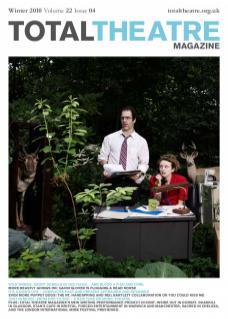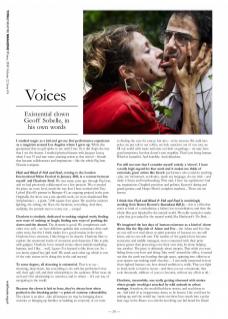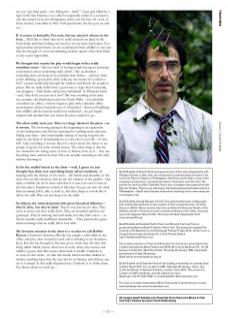I studied magic as a kid and got my first performance experience as a magician around Los Angeles where I grew up. While this guaranteed that no girl spoke to me until I was 18, it did shape the way that I see the theatre. I studied physical theatre with Jacques Lecoq when I was 19 and met some amazing artists at that school – friends that became collaborators and inspirations – like the whole Pig Iron Theatre company.
Flesh and Blood & Fish and Fowl, coming to the London International Mime Festival in January 2011, is a venture between myself and Charlotte Ford. We met many years ago through Pig Iron, and we had previously collaborated on a few projects. We co-created the piece on every level, much the way that I have worked with Trey Lyford [Geoff ’s partner in Rainpan 43, an ongoing project] in the past. Originally, the show was a site-specific work, set in an abandoned Rite Aid pharmacy – a giant, 7,000-square foot space. We used the existent lighting, the ceiling, the floor, the furniture, everything. And then, suddenly, the animals start to come out… creepy!
Charlotte is similarly dedicated to making original work; finding new ways of making us laugh; finding new ways of pushing the clown and the absurd. The dynamic is good. We complement each other very well – we have different qualities that sometimes drive each other crazy, but this I think makes for a good tension in the work. Charlotte loves structure, I like things to be chaotic. Charlotte likes to explore the emotional truths of moments and characters, I like to play with gadgets. Charlotte loves twisted stories about animals mutilating humans, and I like… well, I guess I’ve learned to like those too. So – you know, typical boy/girl stuff. We crack each other up, which is sort of the only reason we’re doing this in the end anyway!
To some degree, all clowning is existential. That is to say – clowning, deep down, has everything to do with the performer’s true self, their ugly self, and their relationship to the audience. What more do we have? Our relationship to ourselves, and to others… It’s our way of navigating in the world.
Because the clown is laid so bare, they’re always best when pushed to the breaking point – a point of extreme vulnerability. The clown is an idiot – like all humans: we may be bringing down societies or bringing up families or building an economy or en route to finding the cure for cancer, but also – we’re morons. We walk into poles, we put salt in our coffee, we lock ourselves out of our cars, we fill our world with waste and raise our kids on garbage – we may have good intentions, but that doesn’t cure stupidity. That’s just being human. Which is beautiful. And horrible. And ridiculous.
I’m still not sure that i consider myself strictly a ‘clown’. I have a really high regard for that word and it makes me think of extremely great artists like Grock: performers who could do anything – play any instrument, acrobatics, speak any language, do any trick – and make it funny and heartbreaking. That said, I have my aspirations! And my inspirations: Chaplin’s precision and politics; Keaton’s daring and grand gesture; and Harpo Marx’s complete mayhem... Those are my heroes.
I think that Flesh and Blood & Fish and Fowl is unwittingly stealing from Buster Keaton’s Steamboat Bill Jr. – this is a film that starts as kind of a melodrama, a father/son reconciliation, and then the whole film gets hijacked by the natural world. We really wanted to make a play that got jacked by the natural world, like Hitchcock’s The Birds…
We imagined the last days of human existence as a kind of clown show; like the flip side of Adam and Eve – the Adam and Eve that no one will ever read about or paint portraits of because no one will know, and no one will care. The tenders of the garden have become secretaries and middle managers, more concerned with their petty power games than preserving even their own skin, let alone helping one another. The piece is ultimately about myopia. That while you were hiding from your boss and doing ‘fake work’ around the office, it turned out that the earth was hurtling through space, spinning into oblivion as your species was making itself obsolete… I was really interested in how short-sighted humans are, how absurd ambition is, really. That you fight so hard, work so hard to become – and then you see a mountain, that took thousands, millions of years to become, without any effort at all…
Charlotte, meanwhile, was really getting obsessed with stories where people would get attacked by wild animals in urban settings. Somehow, she would find these stories, and read them to me. And kind of at inopportune times, to be honest. Like you’d just be waking up, and she would say, ‘turns out these boys snuck into a polar bear cage in the Bronx zoo and the last thing one kid heard his friend say was “get help quick – he’s biting me – hard.”’ A guy gets killed by a tiger in the San Francisco zoo after he repeatedly taunts it; a woman is one day turned on by her chimpanzee and it eats her face off (a lot of those stories); crocodiles in New York apartments, the list goes on and on…
If it comes to fisticuffs, i’m sorry, but my money’s always on the bear… We’d like to think that we’ve really secured our place in the food chain, and that nothing can touch us in our cities and homes. In a typical urban environment, we are so distanced from wildlife of any sort that the thought of even encountering another species other than birds or rats seems impossible.
We thought that maybe the play would begin with a really mundane scene – like two kind of boring people having an annoying conversation about something really cliché – like an abortion – something that you’d expect in a kitchen-sink drama… and just when you’re thinking, ‘good grief, did I really pay my money for a ticket to this?’ a puma would leap through the window and thrash the people to pieces. But we really didn’t have a good way to stage that. Eventually, our designers – Erik Sanko and Jessica Grindstaff of Phantom Limb – said, ‘why don’t you just set it here?’ (We were working at the time in a crummy old abandoned school in North Philly – it looked like a bombed out office.) And we began to play with a desolate office environment. Jessica found photos of Chernobyl – destroyed buildings that wildlife and the natural world now reclaimed – we got hugely inspired and decided that was where the piece wanted to go.
The show really tests you. Time is a huge theme in the piece – as is torture. The looooong pacing in the beginning is an expression of this feeling that your life has amounted to nothing more than just biding your time – that interminable feeling of having long lost the sight of any kind of meaningfulness to your job or your life – it’s just hell. And everything is torture. But it’s a clown show! It’s funny to see people in agony for some twisted reason. The other thing is that the two characters are losing sense of how to behave, how to be… they are becoming more and more feral. They are actually returning to the wild, without knowing it.
As for the stuffed beasts in the show – well, I guess we just thought that there was something funny about taxidermy. In keeping with the themes of the show – the hubris and absurdity of the story that we tell ourselves, that we are the ‘tenders of the garden’. And what a terrible job we’ve done with that if it was ever ours to have in the first place. Taxidermy is kind of like that. You go out into the wild, find an animal, kill it, skin it, stuff it, and then shape it to look like it did in the wild. Why not just keep it in the wild?
As objects, the animals present this great theatrical dilemma – they’re alive, but they’re dead. They’re real, but they’re fake. They seem to move, but they really don’t. They are beautiful and they are grotesque. They’re amazing and well-made, but they don’t move – so they’re actually really inefficient theatrically… They present this great tension onstage that we really fell in love with.
My favourite moment in the show is a section we call Rabbit Rescue. Charlotte’s character, Rhoda, has caught a wild rabbit in the office and put a bow around its neck and is insisting to my character, Jerry, that she has brought in her new pet to work; that she does this thing called ‘rabbit rescue’ when not at work, where she rescues sick rabbits, I guess, and then nurses them back to health. Charlotte is so crazy in this scene – it’s like this insane barren mother instinct to mother anything furry that she can, but it’s so bizarre, and all Jerry can say is ‘cuuuute’ in this really disgusted way. Charlotte is so funny there, I’m always about to crack up…
Geoff Sobelle studied at Ecole Jacques Lecoq in Paris and subsequently with Philippe Gaullier in New York. He furthered his understanding of theatre in his work with Pig Iron Theatre in Philadelphia. Geoff has performed in many of the company’s productions, including Gentlemen Volunteers and Shut Eye. His partner (in work and life) Charlotte Ford is also a longterm associate artist with Pig Iron Theatre. Pig Iron are starting an international physical theatre school in Philadelphia – Geoff and Charlotte will both be teaching at this new enterprise. www.pigiron.org
Geoff Sobelle formed Rainpan 43 with Trey Lyford and the pair collaborated with director David Shiner on the creation of their acclaimed show, All Wear Bowlers (2003). More recently, they have worked with Giovanni Fusetti of the Helikos school in Florence, and are currently working on Next Stop: Amazingland, with magician Steve Cuiffo. The show will debut September 2011. www.rainpan43.org
Geoff Sobelle & Charlotte Ford’s Flesh and Blood & Fish and Fowl is produced by Barrow Street Theatre in New York. The production played The Traverse at St Stephens for the Edinburgh Festival Fringe 2010, where it won a Fringe First and was shortlisted for a Total Theatre Award. http://fleshbloodfishfowl.com
The London premiere of Flesh and Blood & Fish and Fowl is presented at the London International Mime Festival and BITE 2011 at the Barbican Pit, 19–29 January (not 23 Jan). Meet the Artists: Thursday 20 January. BSL interpreted performance: Friday 28 January. Book online at www.barbican.org.uk
Geoff Sobelle and Charlotte Ford will be leading a workshop on comedy duos entitled ‘Stuck With You’ as part of LIMF: Saturday 22 January, 10am–1pm at Central School of Speech & Drama, London. Cost: £40. This is one of a number of LIMF workshops; see the website for more. Bookings:+44 20 7637 5661 or workshops2011@mimelondon.com
For more on London International Mime Festival 2011 performances, events, and workshops see www.mimelondon.com


